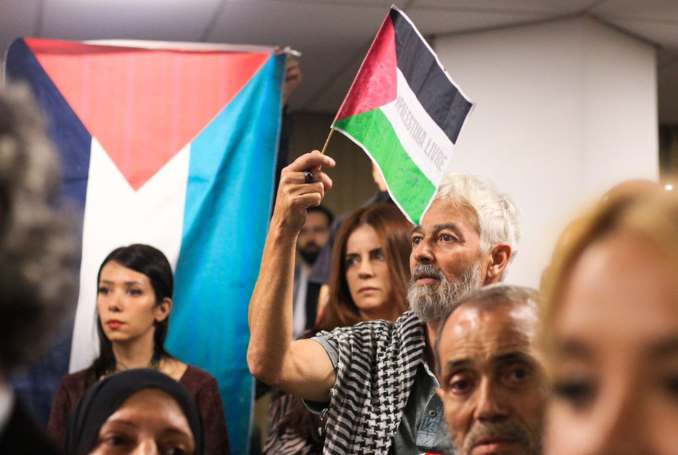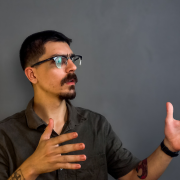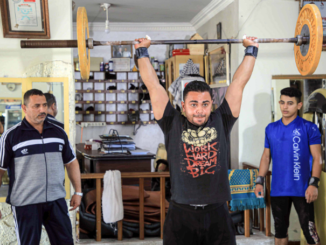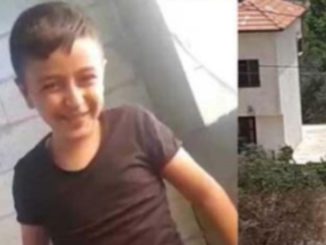
“We must use the law to resist as far as it allows, but also resist outside of it, by any means possible.”
SAO PAULO – The 11th Congress of the Palestinian Arab Federation of Brazil (Fepal) concluded on Monday in Sao Paulo after talks on the role of the Palestinian-Brazilian Diaspora in liberation.
A professor of international law, Salem Nasser, has told the congress that “what is happening in Palestine is a genocide with all the characteristics of a crime.”
“Currently, either the International Court of Justice recognizes genocide and applies the law, or it doesn’t and loses its credibility,” Professor Nasser said during a panel discussion at the congress held in São Paulo, Brazil, from September 20 to 22.
“The Court and the International Criminal Court are coming to an end,” he added, as he analyzed the shortcomings of international law and international bodies in the face of Israel’s military onslaught on Palestinian people.
“We must use the law to resist as far as it allows, but also resist outside of it, by any means possible,” Nasser stressed.
‘Put Zionism in Its Place’
The Congress opened on Friday when Fepal president, Ualid Rabah told more than 500 delegates that “This is the congress that will defeat genocide and put Zionism in its place.”
‘Put Zionism in Its Place’ – Palestinian Arab Federation of Brazil Leader Tells Congress
The event’s focus was Genocide and Apartheid: The Role of the Palestinian-Brazilian Diaspora in the Liberation of Palestine.
“We have fulfilled our objectives,” Rabah, Fepal’s re-elected president, told a reporter from the Brazilian newspaper A Nova Democracia, who was also covering the event for The Palestine Chronicle.
He said that after three days of intense mobilization, “We have outlined new challenges for which we have created new secretariats, such as the Social Mobilization Secretariat and the secretariat that will deal with the institutional rescue of Fepal, the history of the Palestinian movement in Brazil and the history of immigration.”
According to Rabah, the congress mobilized the largest number of delegates, youth and women in the federation’s history.
Role of Global Solidarity
The second day of the congress began with discussions in the working groups focusing on topics such as youth, historical and political formation, women, refugees, human rights and apartheid.
In the afternoon, panel discussions were held with intellectuals, journalists and activists to debate various topics. In addition to Nasser, speakers included Fepal’s Legal Affairs Secretary, Nasser Judeh, and former UN High Commissioner for Human Rights expert, Sami El-Judin, who discussed genocide in Palestine and international law.
Other panels discussed the role of international solidarity, culture and art, as well as the international movement.
The Future of the Middle East – The Next War Has already Started
Francisco Rezek, Brazil’s former Minister of Foreign Affairs and Supreme Court Justice, criticized leaders of the United States for supporting Zionism.
“Joe Biden, this pathetic and feeble figure, has been the American politician who has received the most money from the Israeli lobby in recent decades,” said Rezek.
The Secretary General of the Latin American and Caribbean Palestinian Confederation, Emir Mourad, paid tribute to Lebanon and recalled his youth when he observed the growth of anti-Zionist guerrillas in the Levantine country.
At the closing of the congress, Rabah vowed that ’We will organize ourselves because Palestine needs us.”
Brazil has a population of 200,000 Palestinians and between 6 and 13 million Arabs.
Fepal, founded in 1979 to represent the Palestinian diaspora in Brazil, brings together more than 60,000 immigrants, refugees and their families.
(The Palestine Chronicle)

– Enrico Di Gregorio is a Brazilian journalist. He currently writes for A Nova Democracia and contributed this article to The Palestine Chronicle.









Be the first to comment